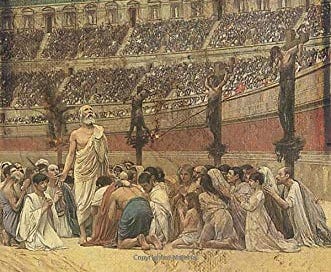If you are looking for the beginning of the study for Eusebius’ Church History then you can go HERE for a brief introduction. At the bottom of the introduction you will find the links to each section of the study guide as it becomes available. If you would like to see the growing list of book studies available for free on this site you can go HERE. Enjoy!
Virtues/Vices/Great Ideas: (Find them in the Text)
Courage, Despotism, Loyalty, Faith, Mortality vs. Immortality
Grammar Questions: (The Information of the Text)
What did Cerdo, the heretic, teach concerning God?
How did Eusebius describe Justin Martyr?
According to Emperor Antoninus Pius, what did Christians become when they “choose apparent death rather than life for the sake of their own god?”
Where was Polycarp a bishop and what was significant about him?
Who was reigning as Emperor of Rome when Polycarp was martyred?
What were the Christians being told they must do in order to avoid martyrdom?
What vision did Polycarp have prior to his martyrdom?
What was reported that “a voice from heaven” said to Polycarp as he was brought into the stadium?
What did Polycarp say to his persecutors “as they were going to nail him to the grid for the fire?”
What is said to have happened when Polycarp was slashed with a sword since his body would not burn?
Logic Questions: (Interpreting, Comparing/Contrasting, Reasoning)
What does it mean to say, “Hadrian paid nature’s debt?”
The text says that some of the heretics would “invoke Hebrew words in order to astonish initiates even more.” Why would they do this and what made it astonishing?
Marcion and his followers taught that the God presented by the Old Testament Scriptures (Yahweh) is a different God than the Father of Jesus Christ. What might be a reason that anyone would even make such a claim? How might we demonstrate such a claim to be false?
Why did the Romans call Christians “atheists?”
Why were Christians unwilling to say “Lord Caesar” and offer him a sacrifice even though it would save their lives?
Why did Polycarp say “away with the atheists” as he was told to do? Was he being unfaithful to the Lord?
Why did Polycarp tell his persecutors that they wouldn’t need nails to keep in the fire?
Why did the Jews think the Christians might start worshiping Polycarp?
Rhetoric Questions: (The Analysis of Ideas in the Text)
How does one become courageous like Polycarp and the other Christians who would not deny their faith in Jesus?
Theological Analysis: (Sola Scriptura)
Read Matthew 10:26-33. How does this passage relate to our present reading? What should we take away from Jesus’ teaching and Polycarp’s example?
Compare and contrast Daniel 3 with the story of Polycarp’s martyrdom. What is similar and what is different? Is there anything we should learn from the differences?



